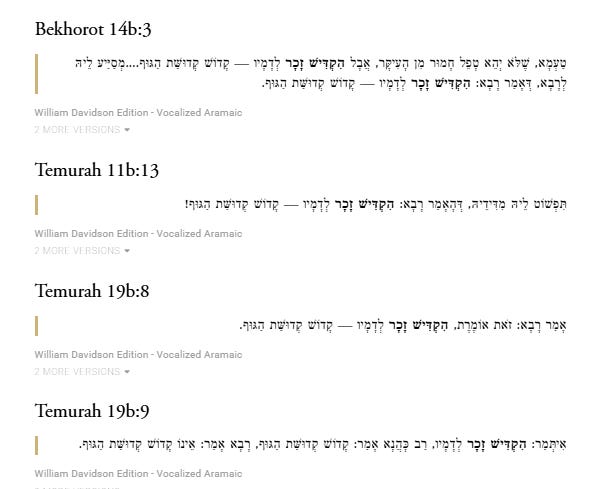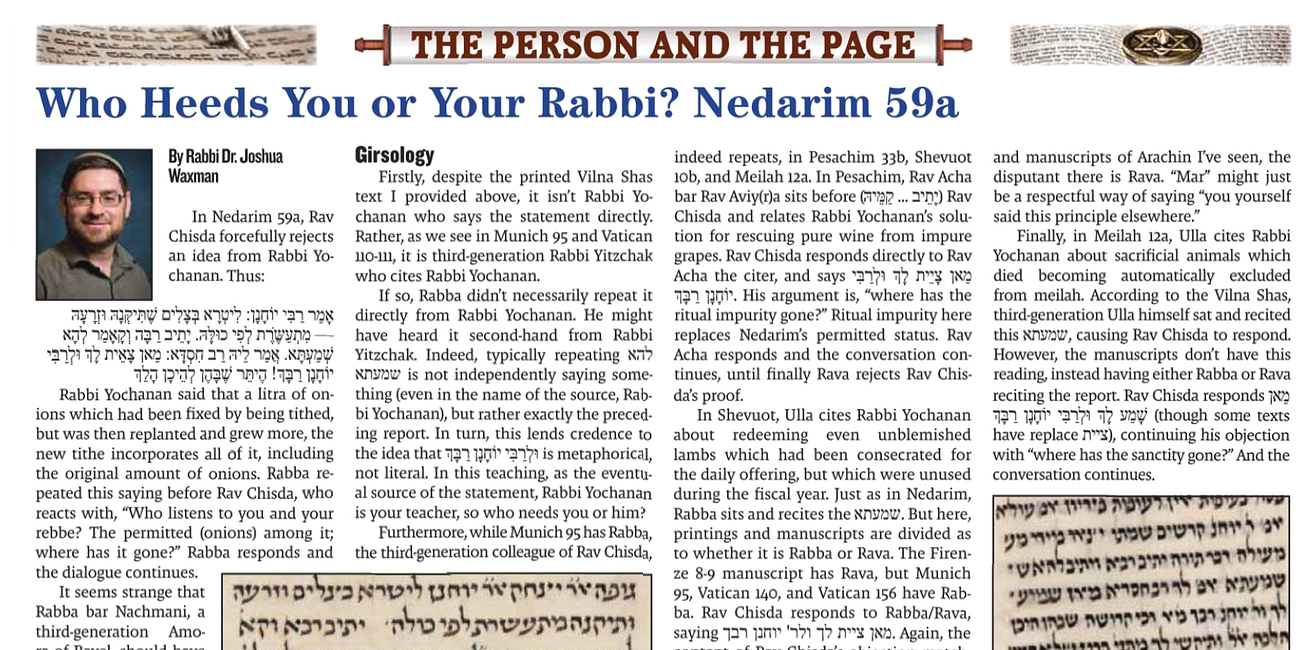Rav Chisda's Attitude Regarding Rabbi Yochanan
For today’s daf, really yesterday’s, Shevuot 10b going on to Shevuot 11a, in which Rav Chisda says to Rabba, מַאן צָיֵית לָךְ וּלְרַבִּי יוֹחָנָן רַבָּךְ, I already discussed this at length about two years ago in a post / article, which I will link to below, though about a sugya in Nedarim.
Just thinking about the local sugya, the initial exchange is:
יָתֵיב רַבָּה וְקָאָמַר לַהּ לְהָא שְׁמַעְתָּא. אֲמַר לֵיהּ רַב חִסְדָּא: מַאן צָיֵית לָךְ וּלְרַבִּי יוֹחָנָן רַבָּךְ? וְכִי קְדוּשָּׁה שֶׁבָּהֶן לְהֵיכָן הָלְכָה?
Rabba was sitting and reciting this halakha. Rav Ḥisda said to him: Who will listen to you and Rabbi Yoḥanan, your teacher, with regard to this halakha? Rav Ḥisda clarified: But the sanctity that was inherent in them, to where has it gone? Since these animals were consecrated as offerings, they should have been endowed with inherent sanctity. Only sanctity that inheres in an item’s value, i.e., an item consecrated to the Temple treasury, can be desacralized through redemption, but an item with inherent sanctity can never be desacralized.
So, a few points. First, this phrasing, מַאן צָיֵית לָךְ וּלְרַבִּי יוֹחָנָן רַבָּךְ, is uttered by Rav Chisda in several locations. Also, a common theme is “X in them, where has it gone,” with X capable of change. Next, here we have Rabba. Some say this indicates Rabba went to Israel. However, it really just means that Rabbi Yochanan is the eventual teacher of the statement. Indeed, look at the preceding line in the gemara, and see that it was Ulla, a one of the nechutei, who brought this statement with him from Israel. Finally, yes, our printed text has Rabba here, and Abaye uses the phrase Mar. But it isn’t so clear cut that this means it is Rabba. Some manuscripts have Rava. And indeed, when Abaye contrasts Rabba’s position here with what Rabba said elsewhere, that reads:
אֲמַר לֵיהּ אַבָּיֵי, וְהָא מָר הוּא דְּאָמַר: הִקְדִּישׁ זָכָר לְדָמָיו – קָדוֹשׁ קְדוּשַּׁת הַגּוּף! לָא קַשְׁיָא; הָא דְּאָמַר ״לִדְמֵי עוֹלָה״, הָא דְּאָמַר ״לִדְמֵי נְסָכִים״.
Abaye said to Rabba: But wasn’t it you, Master, who said: If one consecrated a male ram for its value, since that ram is itself fit to be brought as an offering, it is automatically consecrated with inherent sanctity? Accordingly, to what avail is the court’s stipulation? Since the items are fit to be used as offerings, they will automatically become consecrated with inherent sanctity, even if they are consecrated only for their value. Rabba answers: This is not difficult. This case, where the ram is automatically consecrated with inherent sanctity, is referring to a situation where the donor says that it should be consecrated for the value of a burnt-offering, for which the ram is itself suitable, whereas that case, of the court’s stipulation, is analogous to a situation where he says that a ram should be consecrated for the value of libations, for which the ram itself is not suitable and therefore is not automatically consecrated with inherent sanctity.
and if we look at the parallel quote where Abaye says this to someone, in Arachin 5a, we see that his disputant is Rava (though of course we could / should check variants). Meanwhile, that assertion appears in multiple places, where it seems, at least in printing, to be consistently Rava.
The primary sugya is Temura 19b, where Rava both states it and, in a bit, actually states the opposite in a dispute with Rav Kahana, but then apparently retracts/
Anyway, that is the local flavor for our sugya. Here is my original Jewish Link article:
Who heeds you or your rabbi?
This post is essentially identical to my Link column this past week, because I composed it here. You can read it nicely formatted there, though hyperlinks are only available on Substack.



